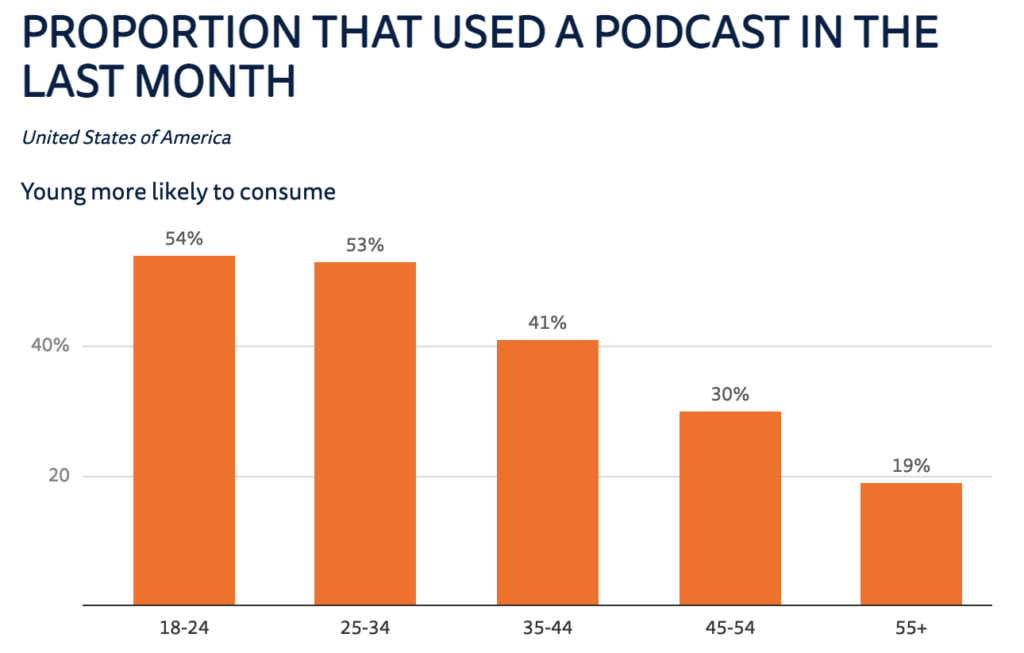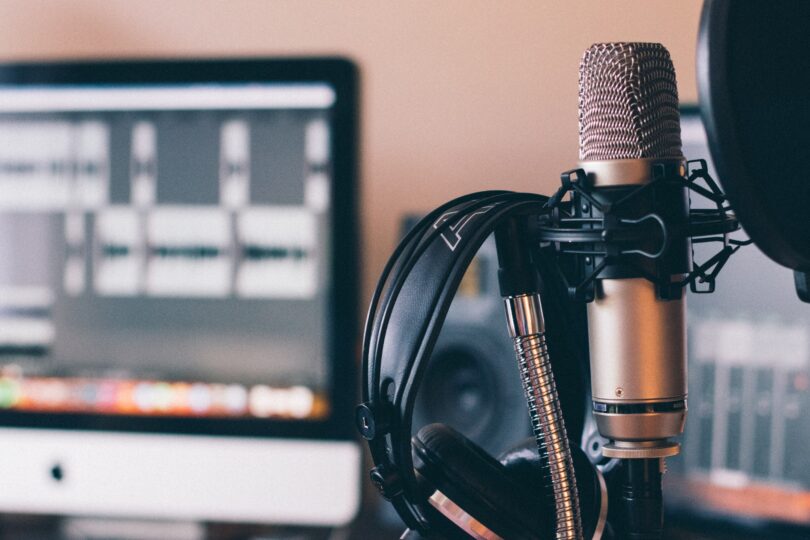Since Apple added a Podcast Directory to its iTunes 4.9 software update in 2005, podcasting has become a mainstream phenomenon. Podcasting is an increasingly important part of the Western news media landscape, and the influence of this new format is slowly becoming clearer. While podcast news has often been seen as an evolution of radio journalism, it has its own distinct qualities and impact upon civil discourse. We should start taking a more serious look at the realm of podcast news and consider how it is impacting the practice of journalism.
New genres or repackaging of old formats?
When evaluating a new medium or technology, we often look to the familiar as a point of reference, and podcasting has drawn obvious comparisons with radio. However, podcast news has increasingly differentiated itself from the radio industry, with distinctive forms of storytelling and design. The reason podcasting has grown into such a significant place in the media landscape is because of its unique qualities which break the confines of what has gone before.
Anecdotal research has shown that many news editors believe podcasting is fomenting a new, more informal genre of audio news centred around a more significant relationship between host and listener, with content that is ‘talkier’ and less rigidly structured. Listening to a news podcast creates a sense of intimacy between the speakers and the listener and an accompanying sense of ‘aliveness’ not found in print news or more structured radio presentations.
Podcasted news has the capacity to reach a potentially wider audience than the increasingly limited fields of print news readers and radio listeners. You don’t need to be particularly literate to consume podcasted news. Neither do you need to enjoy an abundance of leisure time since listening can be a secondary rather than a dedicated activity. Podcast news is fantastically digestible, allowing people to inform themselves with ease.
Podcasted journalism can also provide a more authentic portrayal of the news, as it can relay the aural characteristics of spoken word, ambient sound and music. Print journalism lacks this. By combining robust journalism with creative and detailed sound design, podcast news can have considerable aesthetic appeal and affective power. Podcast news can have more impact than print journalism, in particular, because of the richness of sound and aural detail possible with audio journalism.
What does this mean for journalists and for journalism?
Podcast journalism often feels unrestricted by traditional journalism practices and constraints of deadlines and space. In podcasting, deadlines are looser and word limits don’t really exist. Stories have as much space and time to be explored as the listener is prepared to give them.
Studies on the production and structure of podcast news show that journalists use narrative storytelling techniques more freely in podcasting than in television or written news. This represents a shift away from journalistic norms of objectivity and towards interpretive reporting. Reporters and hosts often appear as characters in episodes, and narrative elements serve to emphasise storytelling over content.
While one of the inherent advantages of the podcasting format is that it can feel more organic and descriptive than written or radio news, this does raise questions about objectivity. When journalists play a more active and informal role in the presentation of the news, it risks exposing their biases to the audience.
New audiences, new demographic divide?
The most striking aspect of podcast consumption is the format’s appeal to younger listeners.

By contrast, older listeners are far more likely to consume traditional radio news as their younger counterparts. In English speaking countries, podcasts are also more popular with highly educated news consumers. Given these socio-demographic divisions, it is worth discussing whether podcast consumption is exacerbating political divisions throughout the western world.
Podcast listeners make decisions about what they want to hear, often before they listen to anything. Radio listeners and television watchers, on the other hand, are presented with a linear stream of information, and therefore a wider range of topics and content, before they hone their focus. Podcasts allow listeners to choose precisely what news they want to consume, and this carries the inherent risk of reinforcing existing biases and political preference. We therefore need to be mindful of the power of podcasts to divide.
Podcasting presents an opportunity for journalism to reach new audiences and extend into exciting areas of communication design. Podcast journalism has grown into a unique and important format and has popularised a more informal style of news reporting that is clearly resonating with new, younger audiences. While all of this is exciting, there is a risk of weakened journalistic standards which can exacerbate social divisions. As with all new frontiers to be explored, we should mind our step to ensure we don’t cast away journalistic integrity.
Featured Image: Podcasting is an increasingly popular form of news consumption. Photo: Will Francis on Unsplash.








While there are arguments to support the notion that podcasting is, in many ways, a repackaging of the traditional radio format, something about podcasting is just really cool. Because it’s cool, it’s reaching younger audiences. This is a great thing for news consumption and developing an informed, curious and engaged generation of news consumers. I already choose what kind of print and radio news I listen to. Having the autonomy to choose what kind of podcast news I consume is just the same, isn’t it?
The rise of podcasting should give hope to those who think that there is a decline/disinterest in journalism. The way in which people (particularly younger generations) have embraced podcasts suggests that there is a considerable part of the population who are interested in consuming the news – they have not ‘switched off’ as many people might first assume. They are just seeking different forms/ways to consume their news. To this extent traditional journalism may benefit from assessing what so many find appealing about podcasting and see if there is room to adapt. By the same token, podcasting should look towards traditional journalism and ensure that journalistic standards are not abandoned in the pursuit of more subscribers.
Podcasting’s embrace of storytelling techniques is only a benefit in my books. It creates engaging news and investigations that carries an audience and makes them care about the issue at hand. Journalism can pray at the altar of its own seriousness, but at the end of the day there’s a lot of information out there and audiences need it to be engaging. Beyond engagement, I think the often meta and reflective nature of podcasting lends itself to a radical transparency that traditional news lacks. Many long form audio investigations will include the journalist considering how their original perception of the issue is shifting with new information – this is what we as listeners are doing too! It’s important to acknowledge that no one is truly impartial but still model how to strive towards a balanced, evidence-based view.
Podcasting seems to offer a new perspective on telling news stories, especially for younger audiences. Reflecting back on when I was at school, listening to a news podcast might have been a really interesting and engaging way to consume news regularly. It also might have helped spark discussions about issues that mattered to me at the time. And as technology evolves, so too does our ability to tailor news in a way that reaches so many different audiences. With its conversational, more informal format of telling news stories, there seems to be much potential for podcasting to continue growing as a modern news platform.
Podcasts give us options. We can choose a topic and deep dive into it, with a casual emphasis on how it is delivered. I find this personally an incredible source to learn and get news. Although, I had never previously considered the point of information bias – it’s very similar to social media. You pick and choose who you follow and therefore, the information you receive. A certain podcaster may influence you on a topic with how casual podcasts can be, and therefore invite opinions. But I do believe the same can be said with radio, depending on the station you listen to, they can also present bias or a point of view on topics. So, I believe regardless of the platform bias and opinion from media outlets is inevitable.
Would it be too much if those providores of the podcasts subjected themselves to journalist standards outside of the actual pieces, but in terms of multiple delivery? Admittedly, do we know that algorithms run behind offers made to listeners and if so, are these not media services providing that? I would suggest that podcasting becomes that one powerful ‘sensible’ element of the media in which balance is given in terms of algorithmic feed. Cody Fowler has covered this exciting form of story-telling well, and given scope for further rumination.
Podcasting presents such a unique opportunity to capture a new audience. While many young people consume news through skimming social media the on demand and very personal nature of podcasts is a way to involve young people in long form journalism, something that radio doesn’t have the freedom to do. Personally, it is one of my favourite ways to consume news as it feels involved, something that is lacking from other news forms. Sometimes though, I think the lines between entertainment and news become blurred. As its popularity rises how can news podcasts maintain unbiased reporting while also capturing that personal element that makes podcasts stand out?